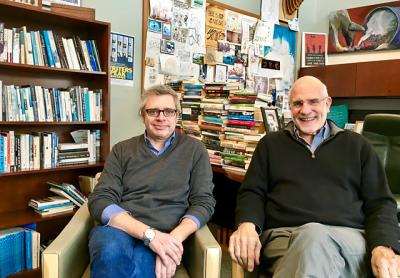Paul Harding: A Brain on Prose

The interview began, as if in essay form, with a wide, philosophical question: “Why am I a writer? To be published or simply to write?”
Speaking in person with Paul Harding, the Pulitzer Prize-winning novelist and the most recent addition to the teaching roster at Stony Brook Southampton’s M.F.A. program in creative writing and literature, is rather like reading one of his books. He presents a large accumulation of detail and a lot of opinions about time, art, and the slippery nature of success.
There’s always this belief that anything has the potential to become interesting if you examine it closely enough, especially the presence of the past, which — as his literary idol, Faulkner, once suggested — is never dead, never really past. And he tends to leave the big answers up to you to decide, making the reader, or the interviewer, feel brilliant too. Or a bit stupid.
Mr. Harding won the Pulitzer in 2010 for his debut novel, “Tinkers,” set in bleak New England and delving into a dying old man’s past relationship with his father, in a time-bending meditation on loss and family ties. The manuscript, said the author, had languished on his desk for several years as a long list of editors at major publishing houses rejected it, no doubt worried it would never sell because of its almost defiant lack of plot.
“But I rejected the rejection letters,” Mr. Harding said wryly. “I wouldn’t change my book to satisfy anybody.” It’s what he tells his creative writing students today: “Write the sort of book you want people to read. Don’t write for people who won’t read your book.”
Eventually, the Bellevue Literary Press, a small independent house, published it in 2009 to little fanfare. The New York Times ignored it completely. And yet this slim 192-page novel was awarded the $10,000 Pulitzer Prize for fiction, an award given to a piece of “distinguished fiction by an American author, preferably dealing with American life,” thereby refuting the assumption that winning such a prestigious award is the crowning achievement of a much-laureled book.
It was “a token of encouragement,” he said of the Pulitzer. “A sign for me to keep doing what I was doing.”
In 2013, Mr. Harding followed his debut with “Enon,” published by Random House. The Wall Street Journal called it one of “the best novels of the year,” but The New York Times concluded that lightning had not struck twice for the author.
The “knife sharpening” among critics was inevitable, according to the author. He knew there would be those who would never like his second book, and he was prepared.
“If I had been 25 when I won the Pulitzer, it might have paralyzed me,” he said. “But I was 42. I had already been in a band for years. I knew not to mix up publicity with art.”
His rock band career began in 1990, when he was a drummer for the Cold Water Flat band, formed with two other students while he was studying at the University of Massachusetts at Amherst. The band lasted about five years, producing two albums and getting some airplay mainly on college radio stations. “We went on tour at some point,” he recalled, “and basically broke up between Houston and Dallas.”
It was then that Mr. Harding enrolled in the Iowa Writers’ Workshop creative writing program, where he became a student of Marilynne Robinson, a Pulitzer Prize winner for her novel “Gilead” in 2005, which also swept the reader into the thoughts of a dying old man. Ms. Robinson’s influence on Mr. Harding was profound: “That’s the life I want for my brain,” he remembered thinking.
At Stony Brook Southampton, Mr. Harding joins an impressive faculty list that includes Meg Wolitzer, Amy Hempel, Cornelius Eady, and Roger Rosenblatt.
Over the last decade, doubts have plagued the inexorable rise of creative writing workshops around the world. The British author Hanif Kureishi, himself a creative writing teacher at a British university, dismissed the existence of a transferable, teachable craft in writing, when he said that writing a story is “a difficult thing to do and it’s a great skill to have. Can you teach that? I don’t think you can.” And with programs costing anywhere between $35,000 and $73,000, a creative writing degree is sometimes regarded as a marker of finances rather than potential.
Mr. Harding doesn’t agree, believing that good writing is a mixture of the calculated and the instinctual. “We have this retrograde romanticism of just set yourself on fire and write,” he said. In reality, like any of the fine arts, he explained, there’s a technical side to the craft. Literature is style, and style comes down to the shape and wording of sentences. His job as a writing teacher is not to impose rules but to help newer or younger writers think about verb tenses, the passage of time, constructing attention, and bringing the reader into the moment, when the mind cleaves to the page.
During the coming spring semester, Mr. Harding will teach an undergraduate writing course as well as a graduate-level seminar on Shakespeare.
Does he ever slum it intellectually? Not really. He admitted spending his downtime poring over masters like Shakespeare, Faulkner, Faust, Melville, and even the Bible. (“I love the way my brain feels when I read them.”) For him, it’s the sort of writing that is intended to be read deeply and repeatedly — something he strives to achieve in his own work.
“I don’t want people to read my book and say ‘I got it’ after one reading. Does anybody ever listen to an album they love only once?”
